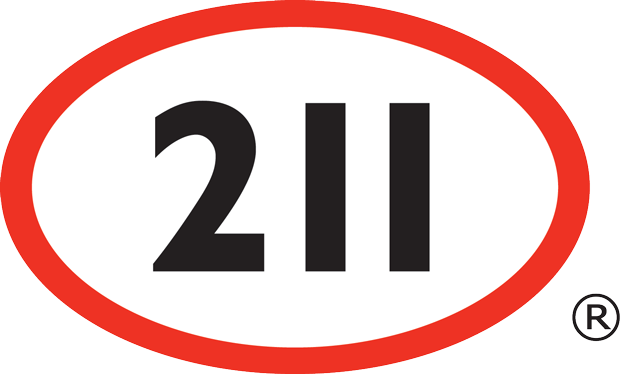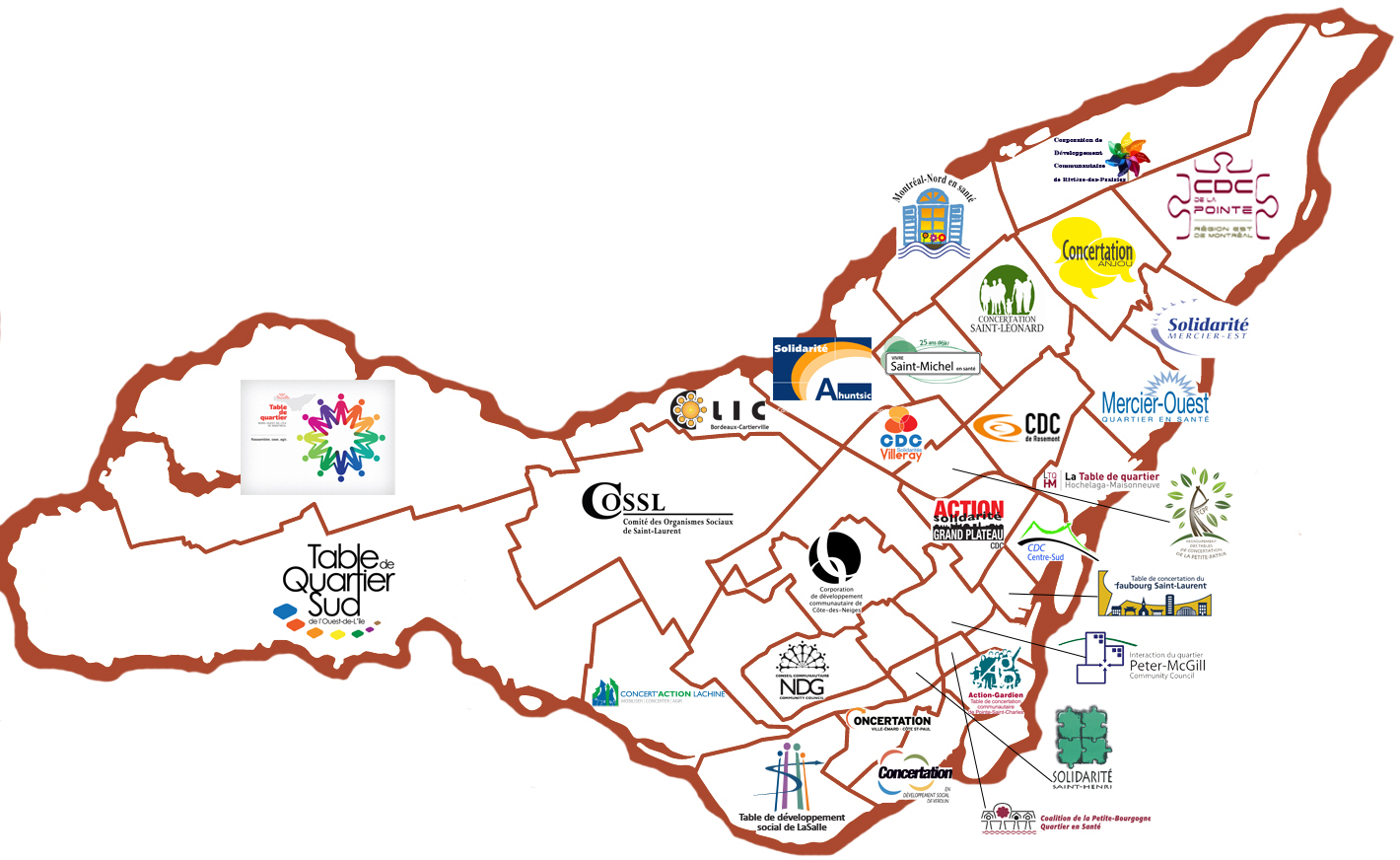Directory of community and social organizations
You can refer to the list of community, public and parapublic organizations, and find them on the map for the regions served by the 211 Greater Montreal.
Types of Community Services
211 refers people to community-based organizations which cover extremely diverse topics. Organizations offering services can be grouped into four (4) broad categories:
1. Non-Profit Organizations
A non-profit organization (NPO) is a group of individuals pursuing a moral or altruistic purpose who do not intend to make pecuniary gains to distribute among the members of the group (Registraire des entreprises).
Most NPOs in our database are incorporated, which means that they are registered in the Registraire des entreprises and at the federal level under the Canada Not-for-profit Corporations Act. These organizations have certain responsibilities, but also certain privileges. Some organizations are not incorporated, however. These are rather rare in the services we refer to, but, for example, some advocacy groups specialized in specific topics or self-help groups do not always have to be incorporated.
To find out if an organization is an NPO in Quebec, you can look in the Registraire des entreprises. Under “Forme juridique,” you should read, “Personne morale sans but lucratif.” Under “Régime constitutif,” you should read Quebec Companies Act, Part III.
Charities and Non-Profit Organizations
All charities are also non-profit organizations, but not the other way around. To issue official receipts for donations or for tax exemptions, you must be registered federally as a charity.
To find out if an organization is a charity, you can consult the Canada Revenue Agency database.
2. Public Organizations (Federal, Provincial, Municipal)
The public bodies in our database are classified based on the governmental decision-making level: federal, provincial or municipal.
- Federal government agencies - ex. Service Canada, Passport Offices
- Provincial government agencies - e.g.: Revenu Quebec, Court of Quebec
- Municipal Agencies - City and MRC Services (Municipalité régionale de comté)
3. Parapublic Organizations
Parapublic organizations are independent entities that are not directly managed by the government. However, they remain the responsibility of the government and are publicly funded.
Examples:
- Healthcare network (CISSS, CLSC, etc.)
- School boards and public education network.
4. Business Enterprises and Cooperatives
Businesses and cooperatives are generally excluded from our database because of our exclusion policy. Our database nevertheless includes some companies in specific fields for which there are no public or non-profit services.
What about social economy?
The term social economy is recent and includes a much broader set of organizations.
According to the Quebec Social Economy Act: The term social economy refers to “economic activities with a social purpose carried out by enterprises whose activities consist, in particular, in the sale or exchange of goods or services […]”.
Social economy enterprises can therefore include NPOs, as well as cooperatives and commercial businesses whose purpose is to “meet the needs of its members or the community.”
ABC of Community-Based Organizations
Although non-profit organizations (NPOs) are extremely different, there are some inescapable services that can be found in most regions.
Community Development Corporation (CDC) and Neighborhood Round Tables
Community Development Corporations (CDCs) are the largest groups of non-profit organizations in Quebec. Their areas of action are community development and support for social economy. There are more than 60 CDCs in Quebec; they usually cover only one Regional County Municipality (RCM), but some work regionally or at neighborhood level (Montreal).
La Table nationale des corporations de développement communautaire (TNCDC) is the provincial umbrella organization of CDCs. You can find the list of CDCs in the province on their website at the following address: http://www.tncdc.com/reseau-des-cdc/
On the Island of Montreal, not all neighborhoods or boroughs have a community development corporation. However, neighborhoods that do not have one can rely on a neighborhood round table which plays a relatively similar role. Montreal neighborhoods are served by either a CDC or a neighborhood round table, but never both. La Coalition montréalaise des tables de quartier is a regional entity that includes the CDC of the Island of Montreal, as well as neighborhood round tables.
To find the round table serving your neighborhood, consult the map below of the Coalition montréalaise des tables de quartier.
Other Provincial and Regional Groups
Apart from CDCs and neighborhood round tables, there are other community-based umbrella organizations.
- The Table des regroupements provinciaux d’organismes communautaires et bénévoles is a provincial table which includes 43 provincial groups of various community-based topics.
- The Réseau Québécois de l’action communautaire autonome (RQ-ACA) is a network of 57 groups of provincial organizations related to autonomous community action. To learn more about autonomous community action, visit the RQ-ACA website.
In the regions served by the 211 Greater Montreal, there are also umbrella organizations at a regional level:
- Lanaudière – Table régionale des organismes communautaires de Lanaudière (TROCL)
- Laurentides – Regroupement des organismes communautaires des Laurentides
- Laval - CDC de Laval
- Montérégie - Table régionale des organismes communautaires et bénévoles de la Montérégie (TROC-Montérégie)
- Montréal – Regroupement intersectoriel des organismes communautaires de Montréal (RIOCM)
Note that all these groups and round tables operate on a voluntary membership, so organizations must register as members of a group or a round table. As a result, many NPOs are not part of these groups and are not directly represented by them.
Sectoral Issue Tables
In addition to the multi-sectoral issue tables (which cover all subjects), there are also numerous sectoral issue tables that focus on specific topics such as: food, families, seniors, immigration, etc. Some of these groups work at a provincial level, but most operate in a region, a city, or even a specific neighborhood.
Our database contains nearly 200 consultation organizations of all categories.
Volunteer Action Centers
As flagship organizations in the community, volunteer action centers exist in almost every region of Quebec. Depending on the population, volunteer centers serve the entire RCM, a city or a neighborhood. Volunteer Centers’ main mission is to support the development, coordination and training of volunteers. Each center can also offer a range of services such as food aid, material goods, health clinics, tax clinics, friendship visits, etc.
There are 114 volunteer centers in Quebec. You can find the list of all volunteer centers on the website Fédération des centers d’action bénévole du Québec.









